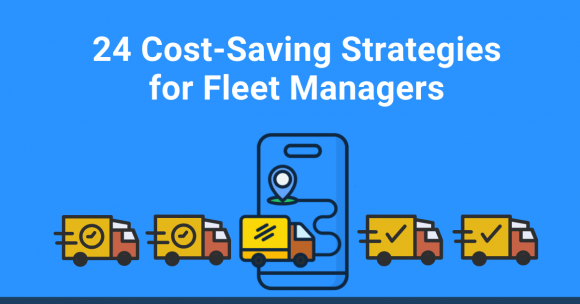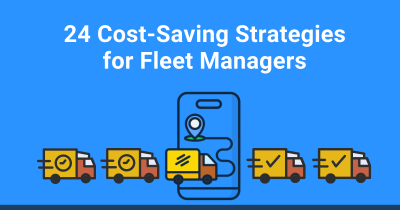When it comes to fleet management, every dollar counts. Rising fuel costs, maintenance expenses, and operational inefficiencies can quickly eat into your budget.
But with the right strategies, you can save money without sacrificing performance.
In this guide, we’ll discuss 24 practical and easy-to-implement cost-saving strategies that can help fleet managers trim expenses, improve efficiency, and get the most out of their resources.
Ready? Let’s go!
What is Fleet Management?
Fleet management involves overseeing and coordinating vehicles, drivers, and operations to ensure smooth logistics and transportation.
Whether it’s delivery trucks, service vehicles, or long-haul transport, effective fleet management minimizes costs, enhances efficiency, and improves safety.
Why Fleet Managers Need Cost-Saving Strategies
Fleet operations are one of the most expensive aspects of many businesses. Fuel, repairs, insurance, and labor costs add up fast.
According to the American Transportation Research Institute (ATRI), fuel accounts for nearly a quarter of operating costs, and maintenance takes up another 10%.
Without clear strategies, these expenses can spiral out of control, affecting profitability.
By adopting cost-saving measures, fleet managers can stay competitive while keeping operations sustainable.
Fuel Efficiency Strategies
1.Optimizing Routes
Let’s not be beat around the bush: poorly planned routes waste fuel and time!
Use route optimization tools to ensure drivers take the shortest, most efficient path. Software like Locate2u integrate real-time traffic data for better planning.
2. Encouraging Better Driving Habits
Harsh braking, speeding, and idling burn unnecessary fuel.
But by using telematics to monitor driver behavior, you can implement training programs to promote fuel-efficient driving.
3. Investing in Fuel Cards
Fuel cards offer discounts and help track spending. This makes it easier to monitor costs and identify savings opportunities.
Vehicle Maintenance and Longevity
4. Regular Preventive Maintenance
Preventive maintenance can reduce breakdowns and extend vehicle lifespan, leading to unnecessary expenses.
But with the right software, your fleet managers will know when to schedule regular oil changes, tire checks, and brake inspections.
This will avoid costly repairs in the long run.
5. Using Predictive Maintenance Tools
Advanced fleet management software analyzes vehicle performance to predict and prevent potential failures, saving you money in the long run.
6. Rotating Tires Frequently
Uneven tire wear leads to higher fuel consumption and replacement costs.
Regularly rotating tires keep them in good condition and reduce expenses.
Labor and Driver Efficiency
7. Streamlining Driver Schedules
Use scheduling software to avoid overworking drivers, reduce overtime pay, and maintain productivity.
8. Offering Driver Incentives
Reward fuel-efficient driving habits or low idle times with incentives. This motivates drivers to adopt cost-saving behaviors.
9. Cross-Training Drivers
Train drivers to handle multiple types of vehicles or roles. This increases flexibility and reduces the need for additional staff during peak periods.
Optimizing Fleet Size and Utilization
10. Right-Sizing Your Fleet
Evaluate whether you have too many or too few vehicles for your operations.
Downsizing underused vehicles or adding efficient ones can save money.
11. Pooling and Sharing Vehicles
Instead of assigning individual vehicles to drivers, use a shared vehicle pool to maximize usage.
12. Monitoring Vehicle Utilization
Use telematics to track how often vehicles are used. Retire or repurpose underutilized vehicles to reduce costs.
Technology and Automation
13. Investing in Fleet Management Software
Modern fleet management software like Locate2u helps track vehicles, optimize routes, and reduce manual labor, saving time and money.
14. Leveraging Telematics
Telematics provides real-time data on driver behavior, vehicle health, and fuel usage, allowing you to make smarter decisions.
15. Automating Administrative Tasks
Automated systems for billing, scheduling, and compliance reduce the time and labor spent on paperwork.
Insurance and Compliance
16. Bundling Insurance Policies
If you manage multiple vehicles, bundling policies can reduce premiums and simplify renewals.
17. Improving Safety Protocols
Safe drivers lead to fewer accidents and lower insurance premiums. Regular safety training can go a long way.
18. Ensuring Compliance
Non-compliance with regulations can lead to fines and penalties!
Use fleet management tools to track and maintain compliance records.
Sustainability and Long-Term Savings
19. Transitioning to Electric or Hybrid Vehicles
While upfront costs can be high, electric and hybrid vehicles save on fuel and maintenance over time.
20. Reducing Idle Times
Excessive idling wastes fuel and increases engine wear. Monitor idle times with telematics and implement policies to minimize it.
21. Adopting Eco-Friendly Practices
Encourage drivers to reduce waste, recycle, and adopt green driving habits. Customers value sustainability, which can also boost your brand.
Vendor and Supplier Management
22. Negotiating Vendor Contracts
Review contracts with fuel suppliers, maintenance providers, and other vendors to find opportunities for discounts.
23. Consolidating Purchases
Buying fuel, parts, or other essentials in bulk from a single supplier often leads to cost savings.
24. Switching to High-Quality Parts
Investing in durable parts reduces the frequency of replacements and lowers long-term costs.
TL;DR: Cost-Saving Strategies for Fleet Managers
Managing a fleet is no small task, but implementing cost-saving strategies makes it easier—and more profitable.
By focusing on fuel efficiency, leveraging technology, and optimizing operations, you can reduce expenses without cutting corners.
Solutions like Locate2u make it simple to track costs, improve routes, and ensure compliance, so you can focus on growing your business.
Start small, and remember: even minor adjustments can lead to significant savings over time.
About the author
Cheryl has contributed to various international publications, with a fervor for data and technology. She explores the intersection of emerging tech trends with logistics, focusing on how digital innovations are reshaping industries on a global scale. When she's not dissecting the latest developments in AI-driven innovation and digital solutions, Cheryl can be found gaming, kickboxing, or navigating the novel niches of consumer gadgetry.











